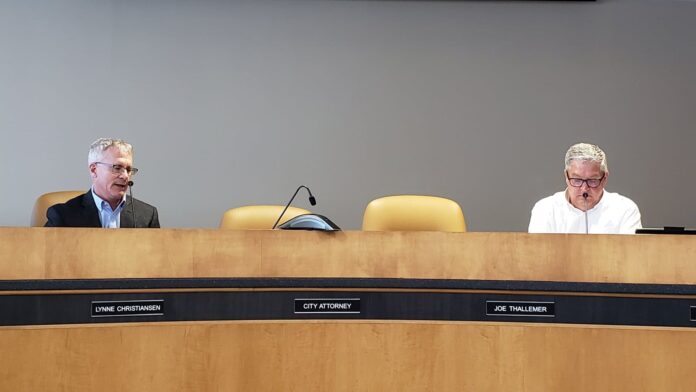
The weekly COVID-19 conference at Warsaw City Hall had a lot of discussion regarding the local economy and impacts, but there was some optimism spoken about the current coronavirus pandemic.
The conference this week included Warsaw Mayor Joe Thallemer, Kosciusko County Health Officer Dr. Bill Remington, Kosciusko County Commissioner Cary Groninger and Kosciusko Chamber of Commerce President and CEO Rob Parker.
Thallemer opened the conference mentioning that the emergency leave policy in place for city employees and buildings was extended for an additional two weeks to go through the first of May. He stated that workers have been staying safe and credits them for maintaining their social distancing while in the office or abroad. The Warsaw Board of Works meeting will still be held on Friday at 10:30 AM, but it will be a virtual conference, with the exception of Thallemer and Clerk-Treasurer Lynne Christiansen.
The mayor then went into some of the economic impacts that could be felt locally throughout the rest of the year and into 2021. Going off a study by Dr. Michael Hicks, an economics professor at Ball State University, Thallemer said there could be a 15-20 percent reduction in local option income tax. You can see Dr. Hicks’ study here.
Thallemer said he continues to be amazed at the local response for support of non-profits, local businesses and the sewing and donating of masks. “If it is considered an issue, right now, we have too many people that want to volunteer,” saying that is a good showing of how much the community cares for its businesses and a good showing of support for the area.
Dr. Bill Remington said he sensed some “guarded optimism” from healthcare workers as it remains to be seen if the county will see a surge compared to state or national statistics. He said we would currently be in the 4th inning of a 9 inning baseball game, thinking the peak of the surge locally will hit either this week or next, with the county getting over the hump in the curve in May and finally heading down the other side in June.
He said he is still “most guarded” about a cluster coming out of one of the area long-term care facilities or the jail like it has in other areas. Remington says we probably haven’t hit one of those “major surges” because we have been doing well with social distancing and following what is guided by the state. Remington says he does sense that “light at the end of the tunnel.”
County Commissioner Cary Groninger reminded the public that the county offices are closed for in-person meetings, unless it is an urgent matter done by appointment. He said the county continues to work to make sure the citizens are taken care of. He mentions that once workers come back, that first week may be a bit hectic as people get caught up with their work, but the second week should be business as usual.
Groninger mirrors what Thallemer and Remington have said, noticing that the locals have been doing well on the effort of “flattening the curve.”
On the business side of things, Thallemer said he’s been working with Kosciusko Economic Development Corp. CEO Alan Tio, exploring a small business relief loan for local small businesses from the COVID-19 impacts.
Many Small Business Administration loans are starting to come through and those will be helpful, Thallemer said.
Groninger said the commissioners on Tuesday voted to support KEDCo seeking funding from the Office of Community and Rural Affairs to provide loans to businesses for employee retention. The loans may be at 0% interest or possibly forgivable.
Rob Parker mentioned that small businesses should have taken advantage of the Paycheck Protection Program loans or the Economic Injury Disaster Loans from the Small Business Administration. He said that if applications have not been done yet, they have a low chance to go through but they should still apply regardless. More information can be found on the Kosciusko Chamber of Commerce website.
Parker also encouraged the public to take advantage of two Facebook groups the Chamber created, To Go Kosciusko, which is mainly used for restaurants to advertise their food and pick-up or delivery options, and Support Kosciusko, more for essential businesses to advertise their services and what is available during the stay-at-home order.
Parker stressed the importance of buying local and right now is the best time to shop local and support the area businesses. Supply chains are hurting, and in turn, are hurting the local businesses.
Once everything returns to that “new normal,” Parker suggests businesses look into the options of what consumers would like to see. One example he said was going from regular menus that are handed out daily, to disposable menus that are used once.
On a re-opening question, Thallemer said he is reliant on the local and state health departments on when they would lax the stay-at-home orders. Remington says they would lean heavily on the side of what is decided in Indianapolis as far as decisions go locally. Thallemer said the “elephant in the room” is weighing how the health and safety side is going into when things officially reopen. “Will we be ready to handle a second wave?” after things reopen and if COVID rekindles.
“It’s not just a “flip of a switch,” things will take time to get back to a new sense of normalcy. You may see changes on greetings, how business is handled, and so on.”




